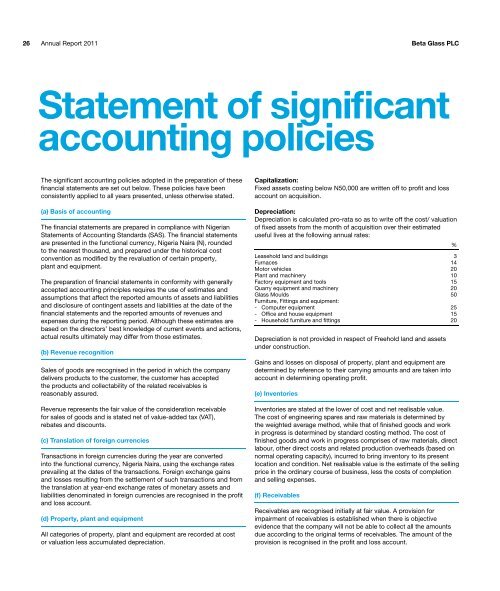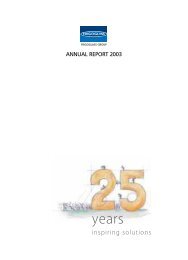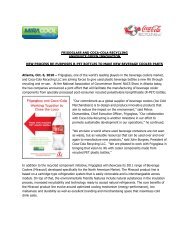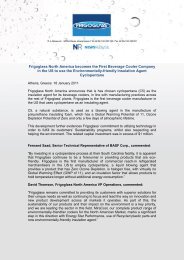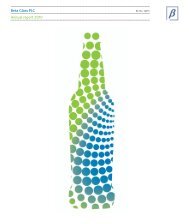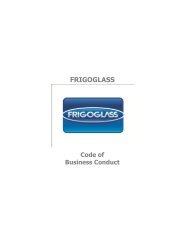RC No. 13215 - Frigoglass
RC No. 13215 - Frigoglass
RC No. 13215 - Frigoglass
You also want an ePaper? Increase the reach of your titles
YUMPU automatically turns print PDFs into web optimized ePapers that Google loves.
26<br />
Annual Report 2011 Beta Glass PLC<br />
Statement of significant<br />
accounting policies<br />
The significant accounting policies adopted in the preparation of these<br />
financial statements are set out below. These policies have been<br />
consistently applied to all years presented, unless otherwise stated.<br />
(a) Basis of accounting<br />
The financial statements are prepared in compliance with Nigerian<br />
Statements of Accounting Standards (SAS). The financial statements<br />
are presented in the functional currency, Nigeria Naira (N), rounded<br />
to the nearest thousand, and prepared under the historical cost<br />
convention as modified by the revaluation of certain property,<br />
plant and equipment.<br />
The preparation of financial statements in conformity with generally<br />
accepted accounting principles requires the use of estimates and<br />
assumptions that affect the reported amounts of assets and liabilities<br />
and disclosure of contingent assets and liabilities at the date of the<br />
financial statements and the reported amounts of revenues and<br />
expenses during the reporting period. Although these estimates are<br />
based on the directors’ best knowledge of current events and actions,<br />
actual results ultimately may differ from those estimates.<br />
(b) Revenue recognition<br />
Sales of goods are recognised in the period in which the company<br />
delivers products to the customer, the customer has accepted<br />
the products and collectability of the related receivables is<br />
reasonably assured.<br />
Revenue represents the fair value of the consideration receivable<br />
for sales of goods and is stated net of value-added tax (VAT),<br />
rebates and discounts.<br />
(c) Translation of foreign currencies<br />
Transactions in foreign currencies during the year are converted<br />
into the functional currency, Nigeria Naira, using the exchange rates<br />
prevailing at the dates of the transactions. Foreign exchange gains<br />
and losses resulting from the settlement of such transactions and from<br />
the translation at year-end exchange rates of monetary assets and<br />
liabilities denominated in foreign currencies are recognised in the profit<br />
and loss account.<br />
(d) Property, plant and equipment<br />
All categories of property, plant and equipment are recorded at cost<br />
or valuation less accumulated depreciation.<br />
Capitalization:<br />
Fixed assets costing below N50,000 are written off to profit and loss<br />
account on acquisition.<br />
Depreciation:<br />
Depreciation is calculated pro-rata so as to write off the cost/ valuation<br />
of fixed assets from the month of acquisition over their estimated<br />
useful lives at the following annual rates:<br />
%<br />
Leasehold land and buildings 3<br />
Furnaces 14<br />
Motor vehicles 20<br />
Plant and machinery 10<br />
Factory equipment and tools 15<br />
Quarry equipment and machinery 20<br />
Glass Moulds 50<br />
Furniture, Fittings and equipment:<br />
- Computer equipment 25<br />
- Office and house equipment 15<br />
- Household furniture and fittings 20<br />
Depreciation is not provided in respect of Freehold land and assets<br />
under construction.<br />
Gains and losses on disposal of property, plant and equipment are<br />
determined by reference to their carrying amounts and are taken into<br />
account in determining operating profit.<br />
(e) Inventories<br />
Inventories are stated at the lower of cost and net realisable value.<br />
The cost of engineering spares and raw materials is determined by<br />
the weighted average method, while that of finished goods and work<br />
in progress is determined by standard costing method. The cost of<br />
finished goods and work in progress comprises of raw materials, direct<br />
labour, other direct costs and related production overheads (based on<br />
normal operating capacity), incurred to bring inventory to its present<br />
location and condition. Net realisable value is the estimate of the selling<br />
price in the ordinary course of business, less the costs of completion<br />
and selling expenses.<br />
(f) Receivables<br />
Receivables are recognised initially at fair value. A provision for<br />
impairment of receivables is established when there is objective<br />
evidence that the company will not be able to collect all the amounts<br />
due according to the original terms of receivables. The amount of the<br />
provision is recognised in the profit and loss account.


